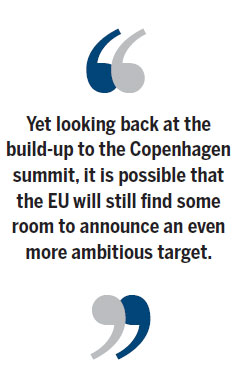EU needs change of approach to be green leader
Updated: 2014-11-07 11:05
By Fu Jing(China Daily Europe)
|
|||||||||||

Brussels is calling its climate change plans the most ambitious anywhere, but a lot more can be done
Thinking of its "sidelined" position at the Copenhagen climate talks five years ago, the European Union sought to steal a march on other global players late last month by announcing the toughest climate change target of any region in the world.
The target to cut 40 percent of carbon emissions by 2030 compared with 1990 levels, together with other goals of energy efficiency and renewable alternatives, came as the world has tried to drum up efforts to reach a new agreement to control the Earth's carbon emissions at the 21st session of the Conference of the Parties to the United Nations Framework Convention on Climate Change due to take place in Paris at the end of next year.
The UN approved of the collective assessment of climate change by global scientists in Copenhagen on Nov 2, upcoming two-week negotiations in Lima, Peru, next month and other "price-comparing" sessions among global emitters are all aimed at helping to reach a deal, although it is still hard to predict how ambitious it might be.
The 10-page document on the climate and energy policy framework announced at the latest European leaders summit can be seen as one of the legacies left by outgoing European Council President Herman van Rompuy, who leaves office on Dec 1, and Jose Manuel Barroso, who was succeeded by Jean-Claude Juncker as European Commission president on Nov 1.
Five years ago when the UN Copenhagen summit ended, it was Van Rompuy, the first EU president under the Lisbon Treaty, who moaned about the Brussels' declining position in shaping global governance on climate change.

Now the EU has not only become the first to announce its binding deal, it is also crediting its plans as the world's "most ambitious".
Yet looking back at the build-up to the Copenhagen summit, it is possible that the EU will still find some room to announce an even more ambitious target.
Back then Brussels initially set a binding target of a 20 percent cut in greenhouse gas emissions from the 1990 level by 2020. But its bargaining chip was that it would also increase its emissions reduction target to 30 percent by 2020 if other major economies increased their targets.
It is highly possible that Brussels will play this "if you do more, I will scale up" game again in the run-up to a Paris deal. Yet, even ignoring the offer as a negotiating tactic, the target of a 40 percent reduction in carbon emissions by 2030 can hardly be viewed as ambitious as the backbone of the EU economy is now the service sector. Like the United States and Japan, it has been outsourcing its manufacturing to Asia, Africa and Latin America by investing overseas.
Meanwhile, economic growth in the EU has declined remarkably since the 2008-09 financial crisis and the debt turmoil that resulted from it. This has not only offered an opportunity for the EU to consider green stimulus for its economic expansion, but also contributed to its carbon emissions due to the reduction in its economic activities.
In fact, the EU could do a better job of managing its green assets. For example, compared with the US, where ambitions to tackle climate change will in all likelihood fall victim to party politics, it is much easier to achieve a consensus on climate actions among the politicians of the EU member states. Former US president Bill Clinton signed the Kyoto Protocol, the first international agreement on greenhouse gas control, but the US Senate refused to ratify it and then former president George W. Bush pulled the US out of the accord.
A market-oriented emissions control legal system, environmentally friendly technologies and the high awareness of the public have also laid solid foundations for the EU to become a global green leader.
However, if it is to play a bigger role in global climate governance, it should be more open-minded and turn such assets into opportunities by unveiling its highest target instead of incrementally increasing it, because this will shorten the bargaining process in the coming process, showing greater determination to deliver green aid and clean technology to poor and developing countries.
The author is China Daily chief correspondent in Brussels. Contact the writer at fujing@chinadaily.com.cn
(China Daily European Weekly 11/07/2014 page12)
Today's Top News
China, Russia agree on military coop projects
Faster pace set in bid to protect Internet
US, France cite concerns about Iran nuclear talks
China donates $2 million to WHO to combat Ebola
Policy banks to lead Silk Road infrastructure fund
Ukraine's rebel leader sworn in
World Cup-winning captain succeeds coach at Evergrande
Ukraine rebels announce results of 'elections'
Hot Topics
Lunar probe , China growth forecasts, Emission rules get tougher, China seen through 'colored lens', International board,
Editor's Picks

|

|

|

|

|

|





